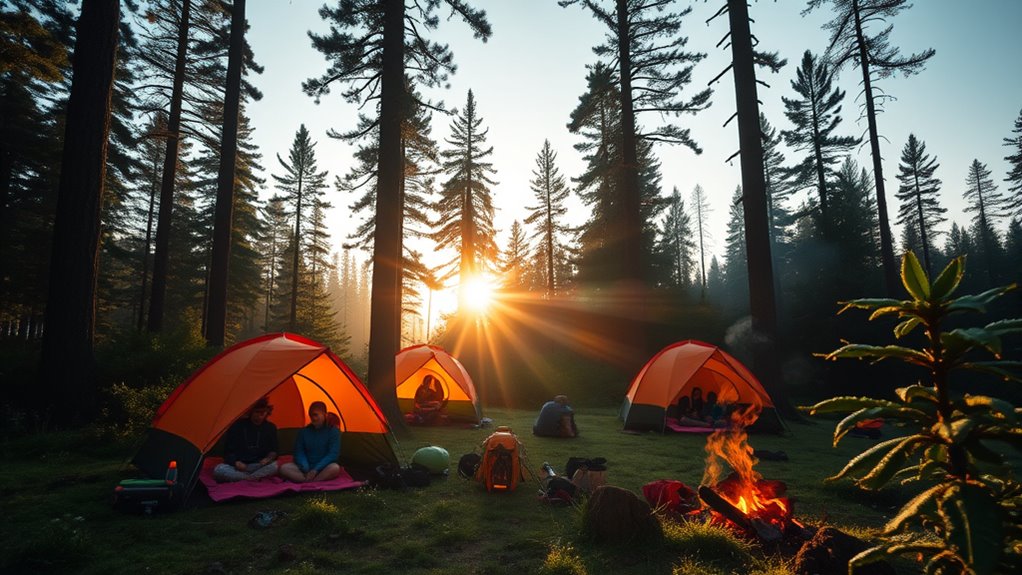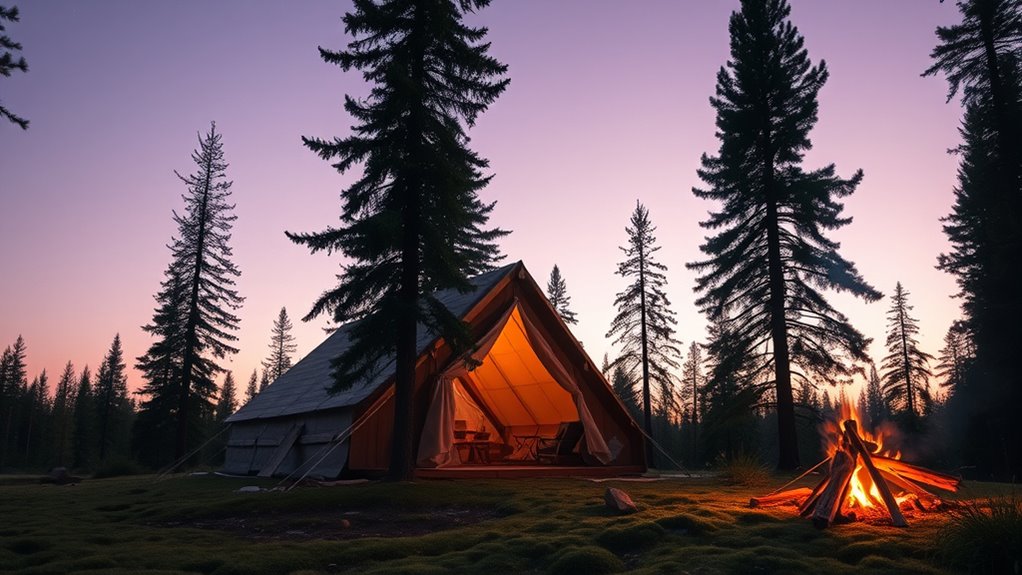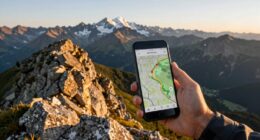To optimize your outdoor sleep and energy during camping, sync your schedule with your body’s natural rhythms by aligning with the sleep cycle and circadian cues. Prioritize sleeping at times that end a sleep cycle, which typically lasts around 90 minutes, to wake refreshed. Use natural light cues, like sunrise and sunset, to set your routines, reduce artificial light, and support your body’s internal clock. Keep exploring to discover how these strategies can make your camping experience more restorative.
Key Takeaways
- Align sleep times with natural light cues to synchronize with your circadian rhythm during camping.
- Plan sleep periods to end at the conclusion of a full 90-minute sleep cycle for optimal rest.
- Minimize artificial light exposure at sunset and morning to support natural melatonin production and sleep quality.
- Use daylight to regulate wake times, enhancing energy levels and outdoor activity readiness.
- Create a sleep environment that mimics natural conditions to reinforce your biological clock and improve restorative rest.

Have you ever noticed how your energy levels and mood seem to follow a natural pattern? It’s like your body has its own internal rhythm, guiding when you feel alert and when you crave rest. This pattern is largely influenced by your sleep cycles, which are crucial for effective energy management. When you’re camping, aligning your outdoor schedule with these natural rhythms can markedly boost your overall experience. Instead of fighting against your body’s signals, you can work with them, making your outdoor adventure more restorative and enjoyable.
Sleep cycles are the foundation of your body’s daily rhythm. They typically last about 90 minutes and include different stages—light sleep, deep sleep, and REM sleep. Each stage plays a key role in physical and mental restoration. When you’re in sync with your sleep cycles, you wake up feeling more refreshed and alert, which is especially important when you’re outdoors and relying on your energy reserves. Camping often disrupts your usual sleep environment, but understanding your sleep cycles can help you plan your night so you wake up naturally and energized. For example, aiming to wake up at the end of a sleep cycle rather than in the middle ensures you don’t wake up groggy. This approach maximizes your energy management, so you have the stamina needed for daytime activities. Recognizing the influence of circadian rhythm can further enhance your ability to adapt your schedule to natural light patterns and improve your rest.
Align your sleep with natural cycles to wake refreshed and energized for outdoor adventures.
To align your sleep with your natural clock, consider your circadian rhythm—the internal clock that regulates your sleep-wake cycle. Exposure to natural light during the day helps reinforce this rhythm, signaling to your body when it’s time to be awake and active. As the sun sets, reduce exposure to artificial light, especially blue light from screens, to promote melatonin production and prepare your body for sleep. When you follow these cues, your sleep becomes more restorative, and you’re less likely to experience fatigue during the day. This synchronization allows you to conserve and manage your energy more effectively, making your outdoor experience more vibrant and less exhausting.
Frequently Asked Questions
How Can Bio-Rhythm Camping Improve Sleep Quality?
You can improve sleep quality by aligning your activities with your natural circadian rhythms. Practice good sleep hygiene by maintaining consistent sleep and wake times, even outdoors. Bio-rhythm camping helps regulate your body’s internal clock, promoting better sleep. Exposure to natural light during the day enhances circadian regulation, making it easier to fall asleep and stay asleep at night. This natural approach supports overall restfulness and improves your sleep quality.
What Equipment Is Essential for Bio-Rhythm Camping?
When you go bio-rhythm camping, vital equipment helps you sync with your natural clock. Carry portable sleep trackers to monitor your sleep patterns and adjust your schedule accordingly. Natural light lamps are essential for maintaining your circadian rhythm, especially in early mornings and evenings. Together, these tools help you stay in tune with your body’s rhythms, improving sleep quality and overall well-being during your outdoor experience.
Are There Specific Locations Best Suited for Syncing With Natural Clocks?
You might believe urban environments are ideal, but remote locations truly support syncing with your natural clock. Studies suggest that darker skies and minimal artificial light in remote areas help regulate your circadian rhythm better. While urban settings offer convenience, they often disrupt your sleep-wake cycle with noise and light pollution. To reconnect with your natural rhythms, choose remote spots like forests or mountain retreats, where nature’s serenity fosters harmony with your biological clock.
How Do Weather Conditions Affect Bio-Rhythm Camping?
Weather variability and temperature fluctuations considerably impact your bio-rhythm camping experience. Sudden weather changes can disrupt your sleep patterns, energy levels, and mood, making it harder to stay aligned with your natural clock. To minimize these effects, plan for flexible schedules, bring appropriate clothing, and stay updated on weather forecasts. Adjusting your activities to accommodate weather conditions helps maintain harmony with your body’s natural rhythms in outdoor settings.
Can Bio-Rhythm Camping Help Reduce Jet Lag?
You can use bio-rhythm camping to help reduce jet lag by promoting circadian alignment. Spending time outdoors exposes you to natural light, which resets your internal clock and supports better jet lag recovery. By syncing your outdoor schedule with your body’s rhythms, you’ll likely experience less fatigue and improved alertness after travel. This natural approach encourages your body to adjust more smoothly, making jet lag less disruptive and helping you feel better faster.
Conclusion
Just like a skilled captain navigates by the stars, syncing your camping routine with your bio-rhythm guides you through a more restful, vibrant adventure. When you listen to your body’s natural signals, you’ll sail smoothly through dawn hikes and starry nights, feeling more connected and energized. Embrace this harmony, and your outdoor journey becomes a dance with nature — a symphony where you’re both the conductor and the audience, discovering treasures hidden in your own biological map.










